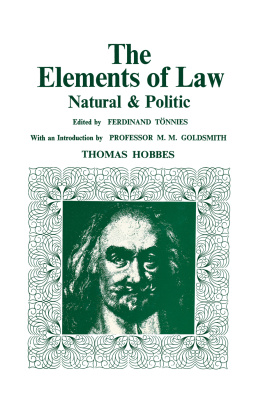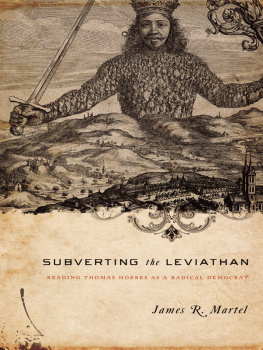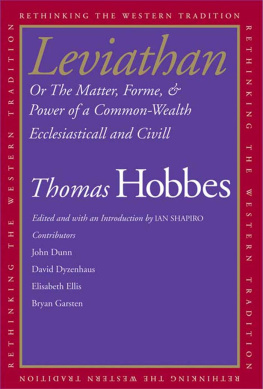Thomas Hobbes - Leviathan
Here you can read online Thomas Hobbes - Leviathan full text of the book (entire story) in english for free. Download pdf and epub, get meaning, cover and reviews about this ebook. year: 1968, publisher: Penguin, genre: Science. Description of the work, (preface) as well as reviews are available. Best literature library LitArk.com created for fans of good reading and offers a wide selection of genres:
Romance novel
Science fiction
Adventure
Detective
Science
History
Home and family
Prose
Art
Politics
Computer
Non-fiction
Religion
Business
Children
Humor
Choose a favorite category and find really read worthwhile books. Enjoy immersion in the world of imagination, feel the emotions of the characters or learn something new for yourself, make an fascinating discovery.
- Book:Leviathan
- Author:
- Publisher:Penguin
- Genre:
- Year:1968
- Rating:4 / 5
- Favourites:Add to favourites
- Your mark:
- 80
- 1
- 2
- 3
- 4
- 5
Leviathan: summary, description and annotation
We offer to read an annotation, description, summary or preface (depends on what the author of the book "Leviathan" wrote himself). If you haven't found the necessary information about the book — write in the comments, we will try to find it.
Leviathan — read online for free the complete book (whole text) full work
Below is the text of the book, divided by pages. System saving the place of the last page read, allows you to conveniently read the book "Leviathan" online for free, without having to search again every time where you left off. Put a bookmark, and you can go to the page where you finished reading at any time.
Font size:
Interval:
Bookmark:
The Project Gutenberg EBook of Leviathan, by Thomas Hobbes This eBook is for the use of anyone anywhere at no cost and with almost no restrictions whatsoever. You may copy it, give it away or re-use it under the terms of the Project Gutenberg License included with this eBook or online at www.gutenberg.org Title: Leviathan Author: Thomas Hobbes Release Date: October 11, 2009 [EBook #3207] Language: English *** START OF THIS PROJECT GUTENBERG EBOOK LEVIATHAN *** Produced by Edward White, and David Widger LEVIATHAN By Thomas Hobbes 1651 LEVIATHAN OR THE MATTER, FORME, & POWER OF A COMMON-WEALTH ECCLESIASTICAL AND CIVILL Thomas Hobbes of Malmesbury Printed for Andrew Crooke, at the Green Dragon in St. Paul's Churchyard, 1651. TRANSCRIBER'S NOTES ON THE E-TEXT: This E-text was prepared from the Pelican Classics edition of Leviathan, which in turn was prepared from the first edition. I have tried to follow as closely as possible the original, and to give the flavour of the text that Hobbes himself proof-read, but the following differences were unavoidable. Hobbes used capitals and italics very extensively, for emphasis, for proper names, for quotations, and sometimes, it seems, just because. The original has very extensive margin notes, which are used to show where he introduces the definitions of words and concepts, to give in short the subject that a paragraph or section is dealing with, and to give references to his quotations, largely but not exclusively biblical. To some degree, these margin notes seem to have been intended to serve in place of an index, the original having none. They are all in italics. He also used italics for words in other languages than English, and there are a number of Greek words, in the Greek alphabet, in the text. To deal with these within the limits of plain vanilla ASCII, I have done the following in this E-text. I have restricted my use of full capitalization to those places where Hobbes used it, except in the chapter headings, which I have fully capitalized, where Hobbes used a mixture of full capitalization and italics. Where it is clear that the italics are to indicate the text is quoting, I have introduced quotation marks. Within quotation marks I have retained the capitalization that Hobbes used. Where italics seem to be used for emphasis, or for proper names, or just because, I have capitalized the initial letter of the words. This has the disadvantage that they are not then distinguished from those that Hobbes capitalized in plain text, but the extent of his italics would make the text very ugly if I was to use an underscore or slash. Where the margin notes are either to introduce the paragraph subject, or to show where he introduces word definitions, I have included them as headers to the paragraph, again with all words having initial capitals, and on a shortened line. For margin references to quotes, I have included them in the text, in brackets immediately next to the quotation. Where Hobbes included references in the main text, I have left them as he put them, except to change his square brackets to round. For the Greek alphabet, I have simply substituted the nearest ordinary letters that I can, and I have used initial capitals for foreign language words. Neither Thomas Hobbes nor his typesetters seem to have had many inhibitions about spelling and punctuation. I have tried to reproduce both exactly, with the exception of the introduction of quotation marks. In preparing the text, I have found that it has much more meaning if I read it with sub-vocalization, or aloud, rather than trying to read silently. Hobbes' use of emphasis and his eccentric punctuation and construction seem then to work. TO MY MOST HONOR'D FRIEND Mr. FRANCIS GODOLPHIN of GODOLPHIN HONOR'D SIR. Your most worthy Brother Mr SIDNEY GODOLPHIN, when he lived, was pleas'd to think my studies something, and otherwise to oblige me, as you know, with reall testimonies of his good opinion, great in themselves, and the greater for the worthinesse of his person. For there is not any vertue that disposeth a man, either to the service of God, or to the service of his Country, to Civill Society, or private Friendship, that did not manifestly appear in his conversation, not as acquired by necessity, or affected upon occasion, but inhaerent, and shining in a generous constitution of his nature. Therefore in honour and gratitude to him, and with devotion to your selfe, I humbly Dedicate unto you this my discourse of Common-wealth. I know not how the world will receive it, nor how it may reflect on those that shall seem to favour it. For in a way beset with those that contend on one side for too great Liberty, and on the other side for too much Authority, 'tis hard to passe between the points of both unwounded. But yet, me thinks, the endeavour to advance the Civill Power, should not be by the Civill Power condemned; nor private men, by reprehending it, declare they think that Power too great. Besides, I speak not of the men, but (in the Abstract) of the Seat of Power, (like to those simple and unpartiall creatures in the Roman Capitol, that with their noyse defended those within it, not because they were they, but there) offending none, I think, but those without, or such within (if there be any such) as favour them. That which perhaps may most offend, are certain Texts of Holy Scripture, alledged by me to other purpose than ordinarily they use to be by others. But I have done it with due submission, and also (in order to my Subject) necessarily; for they are the Outworks of the Enemy, from whence they impugne the Civill Power. If notwithstanding this, you find my labour generally decryed, you may be pleased to excuse your selfe, and say that I am a man that love my own opinions, and think all true I say, that I honoured your Brother, and honour you, and have presum'd on that, to assume the Title (without your knowledge) of being, as I am, Sir, Your most humble, and most obedient servant, Thomas Hobbes. Paris APRILL 15/25 1651. Contents
|
Font size:
Interval:
Bookmark:
Similar books «Leviathan»
Look at similar books to Leviathan. We have selected literature similar in name and meaning in the hope of providing readers with more options to find new, interesting, not yet read works.
Discussion, reviews of the book Leviathan and just readers' own opinions. Leave your comments, write what you think about the work, its meaning or the main characters. Specify what exactly you liked and what you didn't like, and why you think so.













